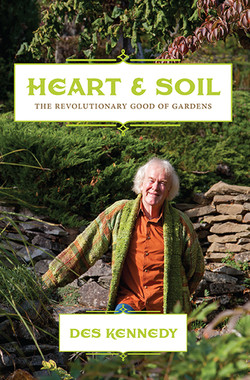Читать книгу Heart & Soil - Des Kennedy - Страница 17
На сайте Литреса книга снята с продажи.
ОглавлениеFarewell, Ancient Shredder
The genuine satisfactions of gardening essentially derive from ensuring that moments of delight, and of occasional rapture, outnumber instances of loss and grief. As my earlier kvetching about sapsuckers attempted to illustrate, there is no shortage of misfortune in a garden. This past spring a favourite lilac shrub—whose scented blossoms had graced our yard for almost twenty years—suddenly lost heart and died just as she was about to bloom again. Accustomed to the arbitrariness of life and death, the gardener accepts such setbacks for what they are and, in the words of disgraced public figures, strives to “go forward.”
But certain reversals cast a wider and more complicated pall. Such seemed to be the case for me when our golden age of shredding crashed to an abrupt and unexpected close. For the previous fifteen years or so, I’d enjoyed a charmed run of being able to dice up bulky garden debris —brittle fireweed and Jerusalem artichoke stalks, prickly raspberry canes, the floppy stems of foxgloves, delphiniums, summer phlox and all the rest—in a shredder. We had acquired this marvellous machine, after lengthy negotiations, from an inventive old gentleman in Victoria who had fashioned it in his backyard from steel plate. Painted fire-engine red and powered by a gasoline motor, it was armed with a heavy steel cutting blade that could voraciously slice and dice whatever twigs and small branches I stuffed into its maw.
When it was time to make compost, sheathed in protective gear, I’d drag the machine to where all the garden debris was stacked, fiddle with various knobs and levers, and then yank on a cord to fire the beast up. Its roaring and shaking was tremendous, its appetite for chewing bunched stalks to pieces so insatiable I called it Beelzebub, after the prince of demons and of dung. When our place was open on the island’s annual home and garden tour, I lugged it out to be admired by the guys who’d come along with their wives despite having little interest in gardening.
Our compost heaps, composed of alternating layers of the shredder’s green gold, along with kitchen scraps and output from our composting privy, were creations of incontestable excellence. Within days of construction, they’d be steaming with heat, and would eventually convert their contents into rich, dark, crumbly compost. At the very heart of that great transformation, and thus at the heart of the garden itself, squatted the shredder.
But, unhappily, and it seemed tragically, this epoch of excellence came to an abrupt end. I was out in the yard shredding dutifully on a bright spring afternoon when suddenly there came a sharp clattering and godawful banging inside the chamber. I shut the machine down and investigated, dismayed to discover that half the great whirling blade had sheared off completely. I dragged the mutilated shredder to a machine shop but was told that repair was impossible because of the way the chamber had been welded together originally. In one fell stroke, like Lucifer banished from heaven, I’d fallen from paradise. In anybody other than a gardener, post-traumatic stress disorder might have been an inevitable reaction to this stunning turn of events.
Ah, yes, the uninformed observer might remark, but surely you can acquire another shredder and carry on as before? Alas, no. For my disabled shredder had been one of a kind, a unique contrivance of muscular brute force whose like will not be seen again. Part of its efficiency derived from a complete disregard for safety issues—a moment’s inattention might easily have cost me a few fingertips or even a whole hand—whereas commercial models seem designed primarily to prevent anyone from losing a fingernail and then suing the manufacturer for millions. I’ve examined some of the shredders for sale at respectable retail outlets, but they have excited only dismay and contempt. To replace our masterpiece with one of those abysmally flimsy knock-offs would be to concede that the universe is unfolding in ways that you would rather it not.
An added consideration, admittedly, is that the old shredder was a carboniferous monster, gulping oil and gasoline and spewing out polluting fumes like our own private tar sands. The biosphere is a better place without it. I like to imagine that in the days to come some inventive genius will design a solar-powered shredder or, in a perfectly closed loop, a shredder powered by the methane gas emitted from the compost heap.
In the interim, we’ve parked the decommissioned shredder in an out-of-the-way corner as a monument of sorts. Meanwhile, I’m reduced to a more hands-on and time-sensitive approach to compost making. For a while, I tried chopping leggy plant material by hand, employing an axe blade that’s welded onto the end of a steel pipe and driven down vertically, as though one were pounding maize. But the work was arduous and primitive and roiled my heart with unseemly longing for the old days of shredding. Determined not to complain, nor to brood unduly over all that’s been lost, instead we worked out a system in which woody material like raspberry canes or fireweed stems no longer go into the compost heap, but rather are consigned to a solitary spot where they’re free to take as long as they require to rot down. Everything else—leafy greens, kitchen scraps, the compost-privy products—goes into the compost heap as before, but in a far quieter and more dignified fashion. Truth to tell, I don’t really miss the roaring of Beelzebub, nor its noxious fumes, nor the sense of frenzy its clamouring induced. Once again, the making of compost is a more poetic, less mechanized affair. I see this as one small personal step away from fossil-fuel dependence and toward a cleaner and quieter environment, a transformation of loss and grief, if you will, into new and improved possibilities.
